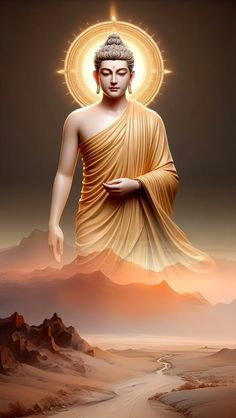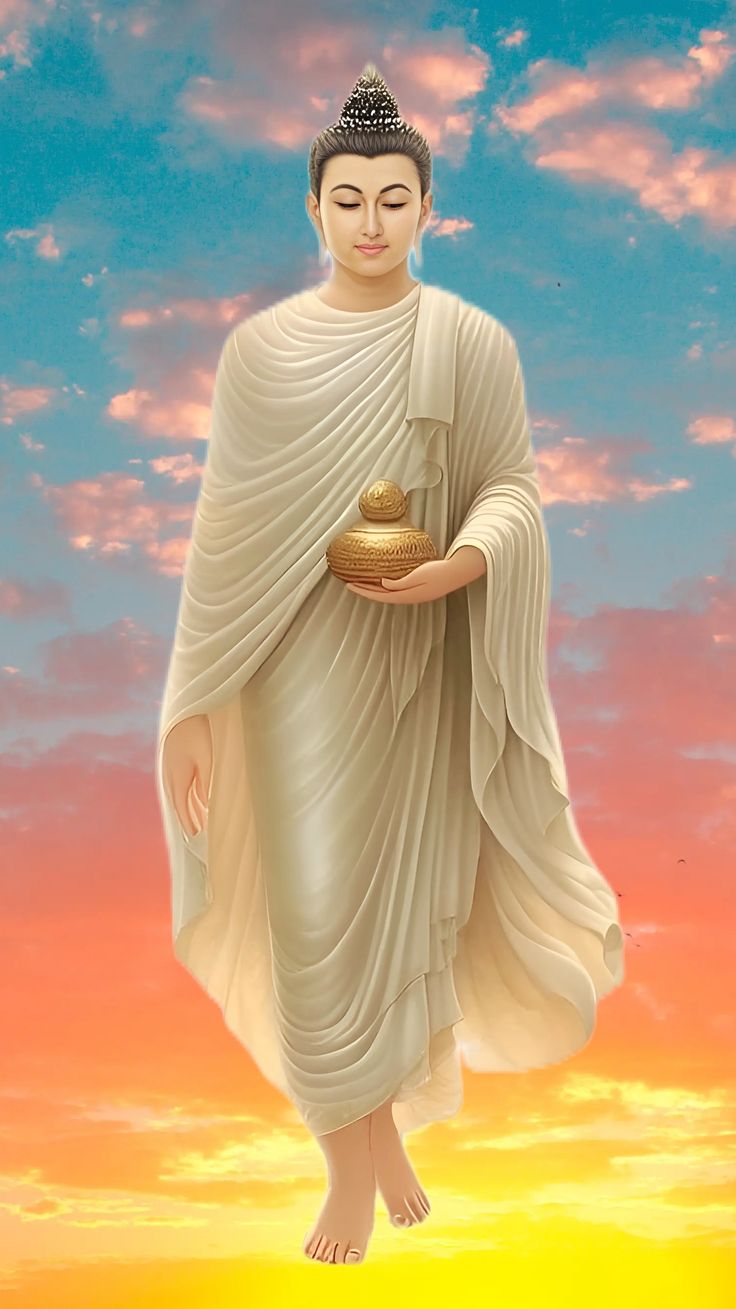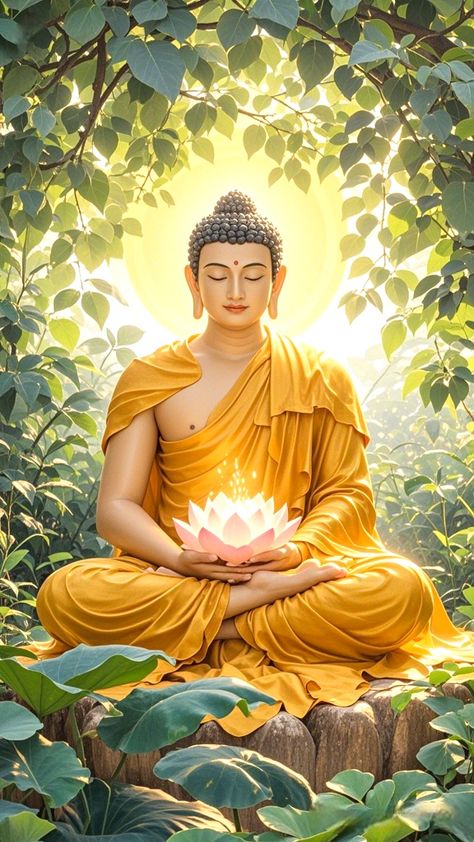Awakening for All: Zazen Treasure: Buddha Life
Tokudo, attaining salvation (transcendence, lit. attain crossing), is living Buddha’s life beyond one’s karma life. In the Zen tradition it is to get Buddha’s robe (kaśāya: decayed in material / color), begging bowl, and precepts – essentially to live with the triple learnings of morality, samādhi (integration), and prognosis.
It is starting a new life as a buddha, awakened one, in supramundane / nirvana (suññatā / śūnyatā: substancelesness: egoless, desireless), renouncing the karmic / mundane world, residing in / sticking to nothing, functioning freely and fully, utilizing and appreciating all that is endowed here / now.
Practicing zazen is virtually doing the triple learnings. It embraces the triple treasures, the triple collective precepts, the five / ten precepts; it is the integration of all dharmas (all beings: world / body / breathing / brain / heart) and providing prognosis in nirvana (no wind, of karma) in free and full function.
The Buddha lived a homeless, simplest life with the least possessions – his clothing and eating bowl – bound by nothing, but abundant in the Dharna. Zazen is not residing / abiding in anything, it is unbound by karmas (physical / verbal / mental, desire / divisiveness / delusion, samsara / suffering) in limitlessness.
December 12, 2024 C.E.
Notes:
- Tokudo (得度) means attaining salvation (度 literally means crossing over to the yonder / supra-mundane world / nirvana), and refers to taking the renunciant ordination following the Buddha’s life with the kesa (袈裟:kaśāya: patchwork robe made of discarded cloth dyed in a decayed color) and begging bowl, with the triple treasures of the Buddha, Dharma, Sangha, the triple collective pure precepts of abstaining from the unwholesome, doing the wholesome, benefitting all beings, and the ten grave precepts of abstaining from willfully taking of life, stealing, indulging in sexual greed, telling lies, indulging in harmful intoxicants, speaking ill of others, extolling the self while slandering others, begrudging the teachings or materials, not harboring hatred, malice or ill-will, not denouncing the triple treasure, with lineage papers, etc. This is called renunciant/ teacher ordination (shukke tokudo). There is also householder/ lay ordination (zaike tokudo), receiving a rakusu (simplified / symbolic kesa robe), the same precepts as above, and lineage papers. The difference between them is that the former must be conscious/striving in renunciant/practicing life and teaching duty. Cf. note 7 also.
- Nirodha (cessation, of substantiality of phenomena, marks of sense objects, desires of heart / mind) is identified with nirvana, which cessation of karma (physical / verbal / mental: intellection / emotion / volition action / habit / heredity).
- Samādhi is usually translated into concentration, in the sense of focusing, or misunderstood as mental only, but it is integration of body / heart / mind / world into oneness without discrimination / separation (intellection / ideation / conceptualization / dichotomy: inside / outside, self / other, here / there, now / then, etc. in space / time, number / volume, etc.).
- Suññatā/śūnyatā (suñña/śūnya is cognate of zero through sfr in Arabic, the –tā is suffix making an abstract noun) means zeroness / emptiness of the content of idea / noun, showing the emptiness of substance of it due to the Dharma of Dependent Co-origination, i.e., all phenomena are dependently co-originated on limitless causes and conditions, so phenomenon’s substancelesness (no self-same, self-sovereign: independent eternal substance, thus no-self).
- By still sitting, one can still karma, settle in nirvana (freed from bad karma), see the Dharma of Dependent Co-origination (all interrelated: related / relative), set full function in new perspective / prognosis, serve, save, and savor all endowed things (body / mind / world) as treasures.
- Zazen is a stilling process as seen in the four stages of zen, as expressed in upekhā / upekṣā (equipoised / equanimity, lit. renunciant / discarding), which is liberating process (from bondage) and seeing / acting in new perspectives / relations to function freely / fully (cf. limitlessness / inexhastiveness in nothingness / no possession).
- There was a great movement of strivers (samana / ṣramaṇa, from the root of ṣram, striving) living itinerant / mendicant lives, renouncing all, sharing their teachings with lay people at the time of the Buddha, beyond sedent, household, or forest dwelling (like the Upanishadic philosophers), both of which were transcending old Vedic / Brahmanic traditions. These two traditions (forest dwelling and wandering striving) were later stipulated in the later Dharma scriptures / traditions in Indian society as the four life stages (āṣrama, striving states, from the root of ṣram) of student, householder, forest dweller, and wanderer. The last two stages seem to be less practical even in India now, much less in other areas, for Buddhists and other traditions with more monasteries, temples, or ashrams (striving places). Thus, zazen at Zen centers or at home is a good way for anyone to practice the Buddha’s way of life.
Cf. on striver’s tradition:
https://en.wikipedia.org/wiki/%C5%9Arama%E1%B9%87a
Cf. on four life states / stages:
https://en.wikipedia.org/wiki/%C4%80%C5%9Brama_(stage)
一切の為の覚醒:坐禅 宝:覚者生活
得度、救済獲得(度=渡、到彼岸)とは業生活を超えて覚者としての生活をして生きる事である。禅の伝統では仏衣(袈裟:kaśāya:捨布・壊色)、(乞食)鉢、戒を受ける事―本質的には戒定慧の三学で生きることである。
それはブッダ、覚者、として、業/世俗世界を捨てて、何物にも住/着せず、自由に十分に機能し、今/此処に恵与されたものを善用/享受し、超俗/涅槃(空性/無実体:無我、無願)の新生活を始める事である。
坐禅の実践は実質的に三学を行うことである。それは涅槃において自由で十分に三帰、三聚浄、五/十(重禁)戒を抱(奉)持し、一切法(一切: 世界/身/口/意/心)の統合であり、般若(知恵:処方)を供与することである。
ブッダは出家し、自らの衣食器だけの最も少ない所有で、最も簡素で、何物にも束縛されず、しかし法においては最も豊富な生活をした。坐禅は何物にも住/着せず(身/口/意/貪/瞋/痴、輪廻/苦)業に束縛されず無限にある。
2024共通年12月13日
註:
1.得度とは度(渡の意味で、彼岸/超俗/涅槃に渡る/至る)を得ることを意味し、袈裟(壊衣、捨てられた布を継ぎ合わせ、壊色に染めた衣)と(乞食:托鉢用)鉢と、仏法僧の三宝、一切不健全を避け、一切健全を行い、一切に恵むという三聚浄戒、故意に生命を奪う事、盗む事、性的貪欲にふける事、嘘を言う事、有害な酩酊物にふける事、他者を悪く言う事、他者を貶して自己を褒める事、教えや法をけちる事、貪瞋痴を抱く事、三宝を誹謗する事を避ける十重禁戒を受け、血脈などを受けて覚者の生活に入ることである。これは出家/師家得度と言われる。また、在家得度があり、絡子(袈裟の縮小/象徴)、上記と同様戒、血脈を受ける。両者の違いは前者が出家/実践生活と教師としての責務について留意/精進することである。註7も参照。
2.止滅(Nirodha:現象の実体、感覚対象の様相、心意の欲望の止滅)は涅槃と同定されるが、これは(身/口/意、知/情/意)業の静止である。
3.Samādhi(三昧:定)は通常、注意の焦点の意味で「(精神)集中」と訳され、心だけと誤解され易いが、それは身心意世界の(知/思想/観念/二項対立:内/外、自/他、此処/彼処、今時/彼時、等、時/空、数/量等)差別分別のない一体への「統合」である。
4.Suññatā/śūnyatā (空性)(suñña/śūnyaはアラビア語のsifrを介して西洋ではzeroとなったが同語源であり、-tāは抽象名詞を造る接尾語である)は、縁起の法、即ち一切現象は無限の原因と条件により相依生起するから、諸現象は無実体であり(自己同一、自己主宰、独立永遠の実体は無く、無我である)、その実体は空であるから、観念/名詞の内容はゼロ/空であるあるということ。
5.静坐に依り人は業を静め、(悪業から自由になり)涅槃に安住し、縁起の法(一切は相関:相依/相対)、新視野/処方で自由/十分機能に付し、一切の恵与された物事(心身界)に奉仕し、救済し、享受することができる。
6.坐禅は、四禅で捨(upekhā / upekṣā:平静者、平静、字義は放棄)と示されるように、静止の過程であるが、それは(束縛からの)解放過程であり、新視野/関係で見解/活動し、自由/十分に機能することである(参考:無一物中無尽蔵)。
7.ブッダの時代に、一切を捨て、ヴェーダやブラーフマナの伝統を超え、家住または森住の定住を超えて、遊行/乞食生活をし、在家者に自らの教えを分かち合う、修行者(samana / ṣramaṇa, 沙門と音訳、語根 ṣram, 努力・精進から) の偉大な運動があった。これら(森住と遊行修行)の二つの伝統は後にインド社会で法律書/伝統に学生期、家住期、森住期、遊行期の四住期 (āṣrama, 修行状態, 修行者と同じ語根ṣramに由来し状態/期間、現在では修行所の意味)として指示された。最後二つの状態はインドでさえも今では実用的でなくなってきている様だが、まして他所ではそうなり、仏教徒や他の伝統では僧院や寺院、アーシュラム(修行所)を持つようになっている。そういう訳で、禅センターや自宅での坐禅は覚者の生活法として誰でも実践できる良い方法である。
参考:沙門(修行者):
https://ja.wikipedia.org/wiki/%E6%B2%99%E9%96%80
参考:四住期:
https://ja.wikipedia.org/wiki/%E3%82%A2%E3%83%BC%E3%82%B7%E3%83%A5%E3%83%A9%E3%83%9E
.
.
.
.
.
.
.
.
.
.
.
.
.
.
.
.
.
.
.





